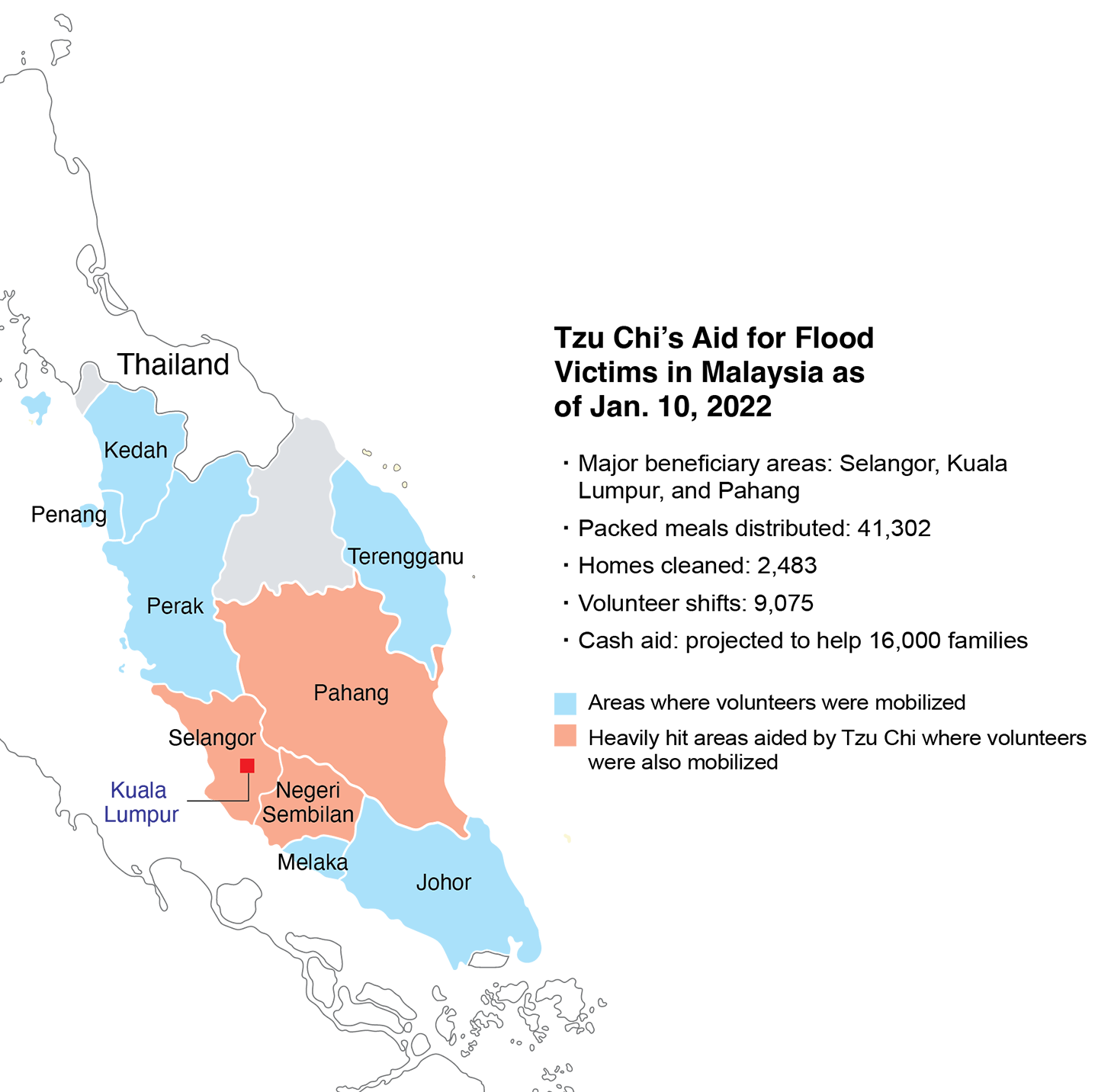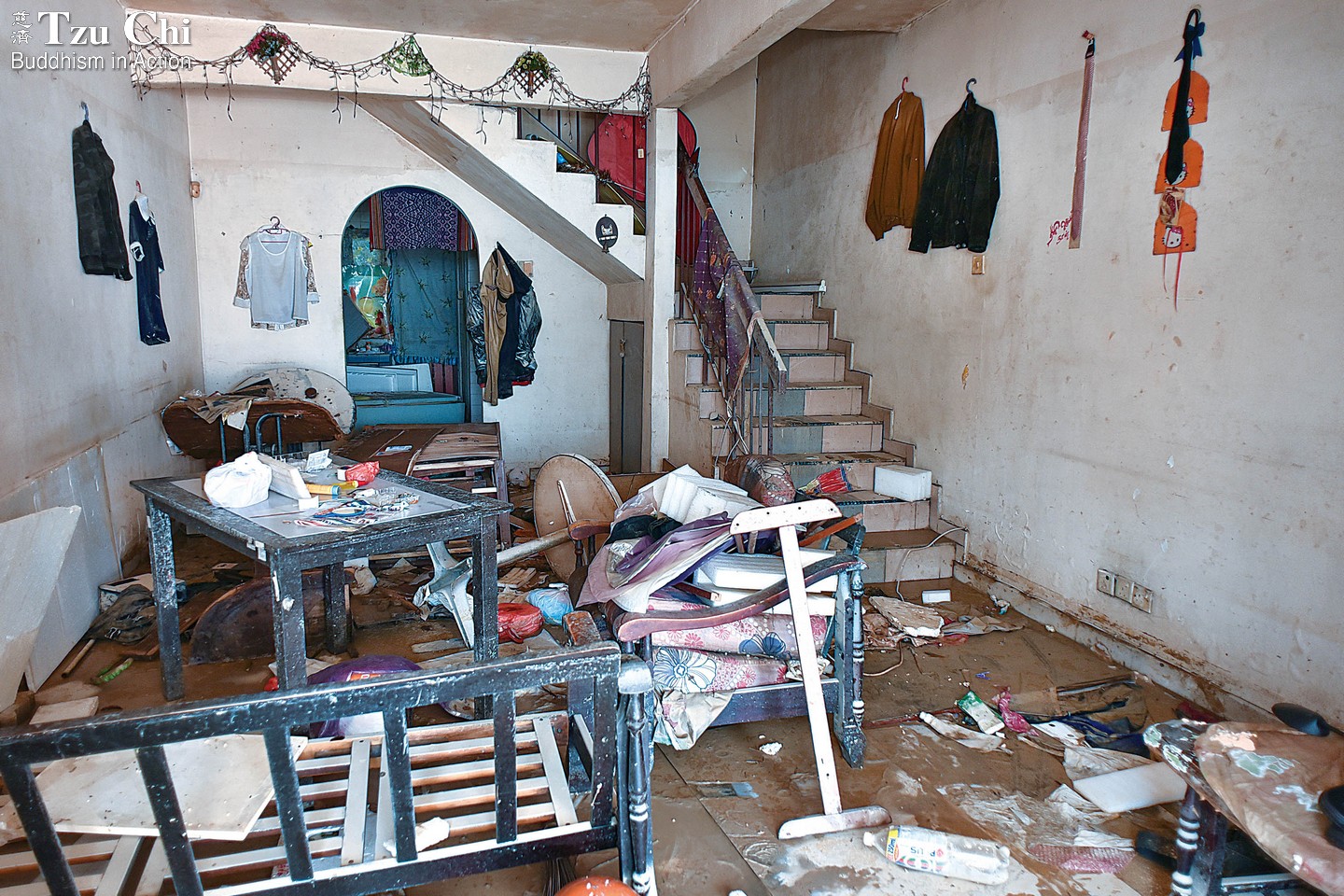Information provided by Tzu Chi Kuala Lumpur and Selangor
Translated by Wu Hsiao-ting
Photos by Lai Jih Chuan
After devastating floods in Malaysia, help poured in for victims in heavily hit areas.

Damaged furniture and other household items clutter the fronts of people’s homes in Taman Sri Nanding, Hulu Langat, southeastern Selangor. Tzu Chi volunteers organized cleanup events in the aftermath of serious flooding in Malaysia in December 2021. Their work helped to return people’s lives to normal.
Heavy downpours pounded Peninsular Malaysia in December 2021, right in the midst of its rainy season. On one of the days—December 18—the area received more rain than in an average month. Floods occurred in eight Malaysian states. Selangor, Kuala Lumpur, and Pahang were among the badly affected areas.
In some areas, floodwaters rose from waist high to one story, then even higher, forcing residents to seek safety in higher places. Cries for help could be heard here and there. Tzu Chi offices and volunteers’ cell phones were flooded with calls for aid. Volunteers in Selangor, Kuala Lumpur, and Pahang managed to enter disaster areas and shelters to assess the situation. They waded through water or rode in small boats to deliver packed meals. They also provided victims with dry food, blankets, clothing, mats, drinking water, and other necessities.
The floods had caused blackouts, so shelters were immersed in darkness at night. But many people never made it to a shelter anyway, remaining trapped in stricken areas as the rain continued to fall. Good news finally came on the morning of December 22: “The water has receded!”
The receding waters resulted in a mess on a staggering scale. Thick layers of mud were left behind. Damaged furniture, broken appliances, and other items soon accumulated into small mountains in alleys and streets. Standing water and garbage strewn around created worrisome sanitary conditions.
Tzu Chi responded by launching cleanups in heavily hit areas. During three consecutive days, starting on December 24, members of the general public, Tzu Chi volunteers, and military personnel together put in more than 6,000 shifts and cleaned up an area of 330,000 square meters (35,843,800 square feet). Volunteers came not just from neighboring states but also from farther areas. Some arrived after traveling several hundred kilometers and even bringing their own cleaning implements. Nima Shokouhfar, an engineer from a company in Penang, on the northwest coast of Peninsular Malaysia, was among those who joined the cleaning project. “We never know when a disaster might strike,” he said. “It might have happened to others this time, but next time it might be you who fall victim—that’s all the more reason why we human beings should help each other. The amount of physical activity I put in today is about the total amount I usually accumulate over a month. I’m bushed. But I had a good day.”
In early January 2022, Tzu Chi volunteers visited heavily hit areas again and called on more than 10,000 families to compile recipient rosters for distributions of cash aid coming later that month.
Into the Water and Through the Mud
Parts of Malaysia were hit by varying degrees of flooding from mid-December 2021 to early January 2022. Here, a volunteer (photo 1) hands a packed meal to a flood victim in Selangor. The state of Selangor was one of the regions deluged with floodwaters, reaching as high as two stories in some areas; most residents were trapped for days in the floods. Tzu Chi volunteers quickly mobilized to provide relief. Koh Poo Leng
Low-lying areas in the state of Pahang flood almost every time it rains. The entire Kampung Baru Sungai Perdak area was swamped during the December flooding. Two weeks after the disaster, residents were still struggling to clean their homes. Ten families, with thick mud all over their houses, appealed to Tzu Chi for help. More than a hundred volunteers from Selangor, Kuala Lumpur, Raub, and Penang pitched in to help on January 5, 2022 (photo 2).
After floodwaters receded in Selangor, volunteers launched three days of cleanup in Taman Sri Muda, Shah Alam, and Taman Sri Nanding, Hulu Langat. The military, members of the public, and Tzu Chi volunteers worked together during the effort. Flood victims (photo 3) thank volunteers for helping speed their recovery from the deluge.

I Cried Several Times in December
By Sia Ah Tong
Edited and translated by Wu Hsiao-ting
Photo by Lee Kok Keong
Many people lost almost all they had to the floods. Extending a helping hand was the least we could do.
We had several days of heavy rain in December 2021. I cried a lot of tears during that time too.
I’m a Tzu Chi volunteer in Selangor, Malaysia. On December 18, rushing flash floods triggered by torrential rains swept away many local resident’s belongings and wrecked their homes. Things that they had spent a lifetime to build were washed away or ruined in a few hours. Arriving in a flooded area on a military vehicle, I jumped into knee-deep water. I was standing on a road that used to be full of traffic, but now all I could see was floodwater. As I went about distributing necessities to flood victims, I listened to many pour out their sadness and heartache.
Dusk gradually descended. As the light slipped away, I wondered how residents were going to spend the night. They had no water or electricity, which had been cut off in the floods. My wife, Chen Wen Yen (曾文燕), and I had learned that a Tzu Chi long-term care recipient had been evacuated to a temporary shelter. We went there and looked through dozens of tents but were still unable to find her. We were getting very worried. It was just then that we heard someone calling out behind us: “Kak [Malay for sister]!” What a familiar voice! It was the care recipient we had been looking for. She hugged my wife and through her sobs told us that she had lost everything.
She then related to us what had happened to her and her children. Though the floodwaters rose and had submerged the roads, she braved the wind and rain to go to work in a factory because she couldn’t afford not to make money. Not long after she arrived at work, however, her child phoned her and said their home had flooded. She quickly set out for home, pushing her bicycle through the floodwaters. Though she had just four kilometers (2.5 miles) to cover, it felt like a lifetime to her before she reached home. When she finally arrived, she saw all their furniture, electrical appliances, and kitchen utensils soaked in or floating in the floodwaters. Her heart broke.
Many years of effort to build up her home were destroyed in a single morning. She had raised her two children alone after her husband had passed away. She had had to be strong and work harder than many others, but she had made it through. However, after suffering such heavy losses in the floods, she felt she just couldn’t hold on any longer.
My heart clenched as I listened to her; tears flowed uncontrollably down my cheeks. We had provided care and support for her for years, and had seen her grow stronger and undergo impressive transformation along the way. Before we even had a chance to celebrate for her, however, everything had gone down the drain. Wen Yen patted her on the back, telling her with her action that we would always be there for her. Tzu Chi would never leave her alone.
We couldn’t dwell in sadness too long. Not long after, I followed other volunteers to an affected area to help clean up. A family had just moved into their new home three months earlier, but looking at their house, you could never tell that it was new. The walls, just recently painted, now bore water stains left behind by the floods. A red cloth hung on the entrance door fluttered forlornly in the wind.
The owner of the house looked completely lost. His eyes vacant, he stared into the air in front of him, as if he was trying to fathom the unfairness of it all. He seemed powerless to move, powerless to pick up the pieces around him. Tzu Chi volunteers bustled around him, tidying things up. His mind went back to those two nights when he and his family were trapped in the floods. Their house had been immersed in water one story high, their electricity was out, and all they had left to eat was some biscuits. Time seemed to have come to a standstill. As the master of the house, he blamed himself for what had happened. He was frightened, but knew he had no choice but to be brave.
Their brand-new furniture, kitchen equipment, and electrical appliances—items that he had pinched and scraped to save up the money to buy—were ruined. “My house is gone, so is my car,” he said. “Everything is gone.” Even though he was as depressed as could be, he told me he was full of gratitude for Tzu Chi volunteers for extending a helping hand to them during this time. Tears streamed down his cheeks as he put his palms together in front of his chest to thank us. Men don’t cry easily, especially in the presence of strangers. I understood he must have been feeling a lot of helplessness and frustration.
My heart ached for him as I listened to his story. I couldn’t hold back my tears either. Many people grit their teeth and work hard just to build a warm home and provide their family with a good life. Sadly, for this man, all that he had worked hard to build lasted just a short time. Reality could be so cruel!
I still vividly remember his tears. I hope he is doing well. As long as one is safe and well, one can always start over.
I witnessed many hearts broken by misfortune this December, but I also witnessed how everyone came together to help. Responding to Tzu Chi’s call for help, people from everywhere rushed to the aid of those afflicted. Putting aside skin color and religious beliefs, leaving behind their work, they picked up cleaning utensils and set to work under the hot sun, cleaning up devastated communities. They worked without any ulterior motives—all they wanted was to restore homes to livable conditions so that victims could return to their homes sooner.
I prayed as I wrote this article, deep in the night on Christmas Eve. I prayed sincerely for the world to be free from disasters and for peace to fill every society.

Everyone’s home looked just as devastated as the next, and it would be difficult for them to clean up everything on their own.



